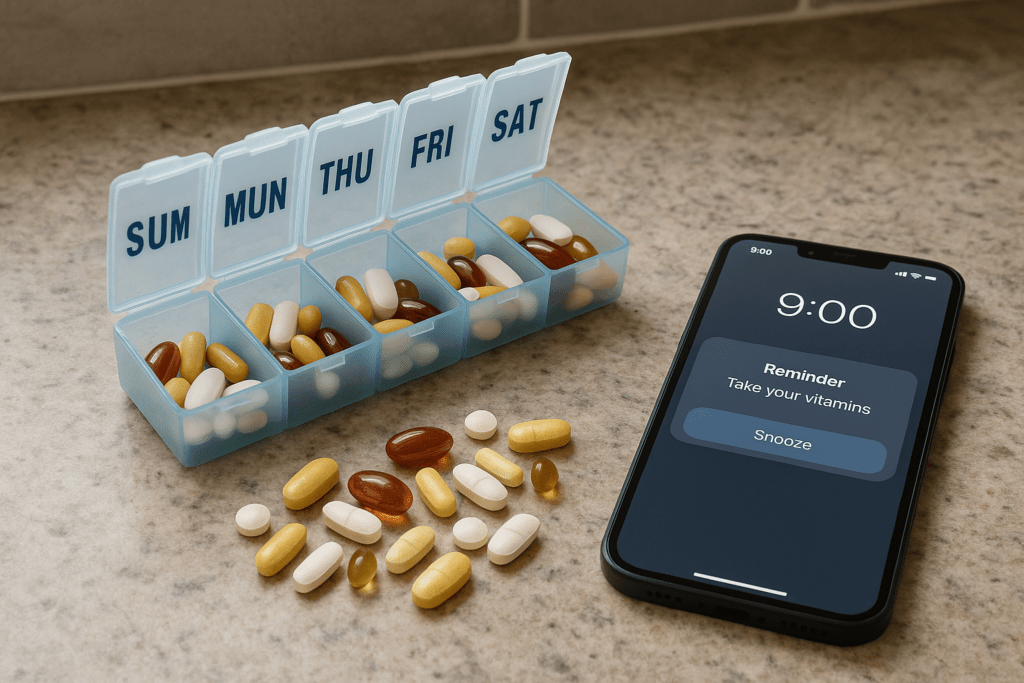In Lithuania, taking supplements is becoming an increasingly popular way to supplement your daily diet. Many people choose them to compensate for possible vitamin or mineral deficiencies, strengthen their immunity, or increase their energy levels. However, thoughtless or incorrect use of supplements may not only not provide the expected benefits, but also cause unwanted side effects. Taking supplements is a process that involves choosing the right products, dosing, and following a regimen to achieve maximum health benefits.

In this article, we will discuss ten of the most important tips on how to properly use food supplements, what principles to follow when choosing them, and how to avoid the most common mistakes. You will learn how to combine different supplements with each other, when to use them, and why some people may need them especially.
Why it is important to use food supplements properly
Food supplements used improperly can become not only useless, but also dangerous. Overdose, incorrect combination, or use at the wrong time can reduce their effectiveness or cause serious health problems. For example, overdose of vitamins A, D, or iron can cause poisoning and damage internal organs.
It is important to understand that not all supplements are equally necessary for every person. According to the Lithuanian Ministry of Health, people who eat a healthy diet usually get enough vitamins and minerals from food. The use of supplements should be based on the individual situation – eating habits, lifestyle, health condition, and, ideally, laboratory tests.
The benefits of supplements occur only when they are used properly and purposefully. Therefore, before starting to take any dietary supplements, it is recommended to consult a healthcare professional – a doctor, pharmacist or dietitian.

10 Top Tips for Taking Supplements
These tips will help you maximize the benefits of dietary supplements and minimize potential health risks. By following these recommendations, you can ensure safer and more effective vitamin use.
1. Timing and consistency
Regular use of supplements at the same time each day is one of the most important factors in ensuring their effectiveness. The body absorbs and uses nutrients best when they are received regularly. Pharmacists recommend creating a schedule for taking supplements and strictly adhering to it.
For example, vitamin B is best absorbed in the morning, as it helps maintain energy throughout the day, while magnesium and some sedative supplements are better taken in the evening. Create a clear regimen and use reminders on your phone or special boxes to help you remember to take your supplements.

2. Food and Supplement Interactions
Some vitamins and minerals are better absorbed with certain foods, while others are the opposite. It is not recommended to take iron supplements with coffee, tea or dairy products, as these reduce iron absorption. However, iron is better absorbed when taken with vitamin C.
Fat-soluble vitamins (A, D, E, K) should be taken with foods that contain healthy fats – olive oil, avocado or nuts.

This increases their bioavailability and reduces potential irritation to the digestive system.
Pharmacists’ advice often includes recommendations to take supplements after meals to avoid stomach upset, especially if the supplements contain zinc or iron.
3. Stick to the recommended doses
Overdosing on supplements can be more dangerous than not taking them. You should be especially careful with fat-soluble vitamins (A, D, E, K) because they accumulate in the body and can reach toxic levels. For example, an overdose of vitamin D can cause hypercalcemia – an increased level of calcium in the blood, which can lead to heart rhythm disorders and kidney problems.
Overdosing on minerals, especially iron and zinc, can also cause serious health problems. According to the Lithuanian Dietetic Association, the recommended daily allowances (RDAs) are set based on scientific research and should be considered an upper limit, not a target.
4. Avoid mixing competing supplements
Some minerals compete for absorption mechanisms in the body. Calcium and magnesium, iron and zinc, copper and zinc – these mineral “duets” can interfere with each other’s absorption if taken at the same time.
Optimal combination of supplements requires a thoughtful schedule. For example, it is recommended to take calcium and iron preparations with a break of at least 2-3 hours. It is also necessary to separate the use of zinc and copper supplements, because zinc can interfere with the absorption of copper, especially when taken in large doses.
5. Take fat-soluble vitamins with food
Vitamins A, D, E and K are fat-soluble vitamins that require fat for absorption. Taking these vitamins with fatty foods can increase their absorption by up to 50%. This is especially important when taking vitamin D supplements, which are often recommended in Lithuania due to insufficient sunlight, especially in the cold season.
Vitamin D is recommended to be taken with lunch or dinner, when we usually eat more fatty foods. Studies show that vitamin D is absorbed more effectively when taken with a main meal than when taken on an empty stomach.
6. Alcohol and caffeine can interfere with absorption
Alcoholic beverages and caffeine-containing products (coffee, strong tea, energy drinks) can significantly reduce the absorption of some vitamins and minerals. Alcohol is particularly harmful to the absorption of B vitamins, zinc, magnesium and calcium, and also burdens the liver, which is involved in the metabolism of many nutrients.
Caffeine can interfere with the absorption of iron, calcium and B vitamins. Therefore, it is recommended to maintain at least a 1-2 hour interval between taking supplements and drinking coffee or tea.
7. Be careful when combining probiotics with dairy products
Probiotics are dietary supplements with live bacterial cultures that are designed to improve the gut microflora. While many people take probiotics with dairy products, some studies suggest that it is best to take them 30 minutes before or 2 hours after a meal.
Lactic acid and other compounds in dairy products can neutralize the effects of some probiotics. Therefore, if you are taking probiotics in capsules or powder, it is best to take them with water, not milk or yogurt.
8. Choose supplements based on individual needs
Before starting any dietary supplement, it is recommended to have blood tests to assess which substances your body is truly lacking. The choice of a dietary supplement should be based on individual characteristics: age, gender, dietary habits, physical activity level and health status.
For example, vegetarians and vegans are often deficient in vitamin B12, iron and zinc. Women of reproductive age often need iron supplements due to menstruation, and older people may benefit from vitamin D and calcium supplements to maintain bone health.
Doctors and scientists recommend not to follow only popular trends or advice from friends – each person needs an individual approach to the use of supplements.
9. Complete the full course of supplements
Many supplements, especially those intended to correct nutrient deficiencies (e.g. iron supplements for anemia), take time to achieve their full effect. Health supplements often need to be taken for several months to achieve tangible results.
Studies show that vitamin D levels in the blood normalize only after 2-3 months of regular use. Similarly, with iron supplements – hemoglobin levels in the blood begin to increase only after a few weeks of continuous use, and are fully restored only after 3-6 months.
It is important not to stop taking supplements as soon as you feel the first positive changes and to complete the entire recommended course, unless your doctor tells you otherwise.
10. Regularly consult with healthcare professionals
Even over-the-counter supplements can have serious health effects, especially when taken long-term or in combination with medications. Regular consultations with a doctor or pharmacist will help ensure the safe and effective use of supplements.
Pharmaceutical specialists emphasize the importance of informing your doctor about all supplements you take, as some of them can interact with medications. For example, St. John’s wort supplements can reduce the effectiveness of contraceptives, and vitamin K can interfere with the action of blood-thinning drugs.
Regular blood tests will also help monitor whether the supplements are having the desired effect and whether there is an excess accumulation of vitamins or minerals.
Special advice for different groups
The need for supplements and the specifics of their use vary depending on age, gender, health status and lifestyle. Here are some specific tips for different groups of people.
Supplements for Women
Women often need specific supplements due to hormonal fluctuations and physiological characteristics. Women lose iron during their menstrual cycle, so iron supplements can be useful to prevent anemia. It is recommended to take iron with vitamin C for better absorption.
Pregnant women must take folic acid (at least 400 micrograms per day) during the first three months of pregnancy to reduce the risk of neural tube defects. Calcium and vitamin D supplements are often recommended for postmenopausal women to maintain bone density.
Omega-3 fatty acids can also be beneficial for women, as they help regulate hormone balance and reduce inflammation.
Supplements for Men
Magnesium supplements are often recommended for men, which help maintain normal muscle function, reduce fatigue and are involved in energy metabolism. Active men may benefit from amino acid supplements to help rebuild muscles after intense training.

Vitamin D is important not only for bones, but also for the production of testosterone, a hormone responsible for maintaining muscle mass, sexual function and energy levels in men. In the Lithuanian climate, especially in winter, vitamin D supplements are recommended for most men.
Zinc is also an important trace element for men, participating in the production of testosterone and supporting the immune system.
Supplements for the elderly
With age, the body’s ability to absorb some nutrients from food decreases, so older people often need additional vitamins and minerals. Vitamin D and calcium are especially important for the elderly, as they help maintain bone strength and reduce the risk of osteoporosis.
B vitamins, especially B12, are often found in insufficient quantities in the bodies of older people due to a reduced amount of stomach acid, which is necessary for the absorption of the vitamin from food. Therefore, it is recommended to take B12 supplements under the tongue or in the form of injections.

Magnesium is also important for older adults, as it helps maintain normal nervous system function and heart rhythm. Because of the frequent use of medications, it is especially important for older adults to consult a doctor about possible drug-supplement interactions.
Supplements for Vegetarians and Vegans
People who avoid animal products often lack certain vitamins and minerals that are naturally found in meat, fish, and dairy products. Vitamin B12 is a key supplement that vegetarians and especially vegans should take, as this vitamin is only naturally found in animal products.

Iron supplements are also important because plant-based iron (non-heme) is less well absorbed than animal-based iron. Vegetarians and vegans should choose iron supplements that also contain vitamin C, which improves iron absorption.
Zinc, iodine, and omega-3 fatty acids (from algae sources) can also be useful supplements for vegetarians and vegans. Calcium supplements may be necessary for those who do not consume dairy products.
Common mistakes and how to avoid them
In Lithuania, as in many countries, the use of dietary supplements is often accompanied by mistakes and myths. Here are the most common mistakes and tips on how to avoid them.
One of the biggest mistakes is self-prescribing supplements without consulting a specialist. Many people start taking supplements based on information found on the Internet or advice from friends, without taking into account their individual needs and potential risks. Before starting to take any supplements, it is worth consulting a doctor or pharmacist.
Another common mistake is taking several supplements with overlapping ingredients. For example, a person may take a multivitamin that already contains vitamin D and then take a separate vitamin D supplement, thus exceeding safe doses. Always check the ingredients of any supplements you take to make sure you are not doubling up.

The idea that “natural” means “safe” is also a dangerous misconception. While many herbal and natural supplements are safe, some can have strong effects on the body and interact with medications. For example, St. John’s wort can reduce the effectiveness of contraceptives, and ginseng can interfere with the action of blood thinners.
The safety of supplements also depends on their quality. When choosing dietary supplements, pay attention to the manufacturer’s reputation, quality certificates, and whether the product has been tested by independent laboratories.
Another common mistake is to copy what works for others. Each person’s body is unique, and the need for supplements depends on many factors – age, gender, health status, genetics, diet, and physical activity. What helps a friend or family member will not necessarily be useful for you.
Conclusions
Taking dietary supplements can be a useful way to supplement your diet and address specific health problems, but only when they are used correctly and purposefully. By following the ten tips discussed – from consistency in timing and dosage to regular consultations with specialists – you can maximize the benefits of supplements and minimize potential risks.
Remember that the best source of vitamins and minerals is always a varied and balanced diet. Food supplements, as the name suggests, should only supplement, not replace, a healthy diet.

Before taking any supplements, assess your individual needs, consult a healthcare professional, and always read product labels carefully and follow dosage recommendations. Only such a responsible approach to supplement use will ensure their safety and effectiveness.
Frequently Asked Questions
When is the best time to take supplements – morning or evening?
It depends on the type of supplement. Fat-soluble vitamins (A, D, E, K) are best absorbed with food containing healthy fats – usually in the morning or at lunch.

Iron is most commonly taken in the morning with vitamin C. Magnesium may be most beneficial in the evening. Always follow label directions and your doctor’s recommendations.
Is it safe to take multiple supplements at the same time?
Not always. Some supplements can interfere with each other’s absorption or cause overdose if their active ingredients overlap. Talk to your pharmacist or doctor before combining multiple supplements.
Do I need supplements if I eat a balanced diet?
Not always. Most healthy people get enough vitamins and minerals from food. However, certain groups (pregnant women, the elderly, those with specific deficiencies or dietary restrictions) may benefit from certain supplements after consulting a healthcare professional.
What are the signs of a supplement overdose?
Symptoms depend on the nutrient, but can include nausea, headaches, digestive problems, and in severe cases, organ damage. Always follow the recommended dosages.
How long does it take to see the effects of supplements?
Some supplements may show benefits within a few weeks, but deficiencies or chronic problems may require 2-3 months of consistent use. Laboratory tests can help monitor progress.
